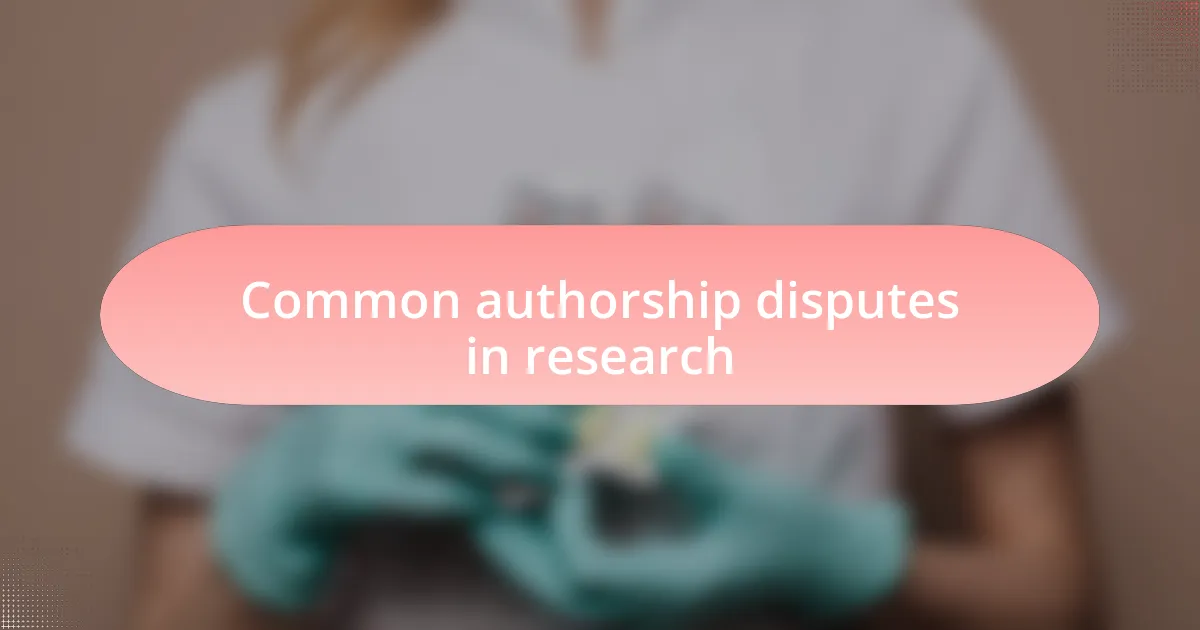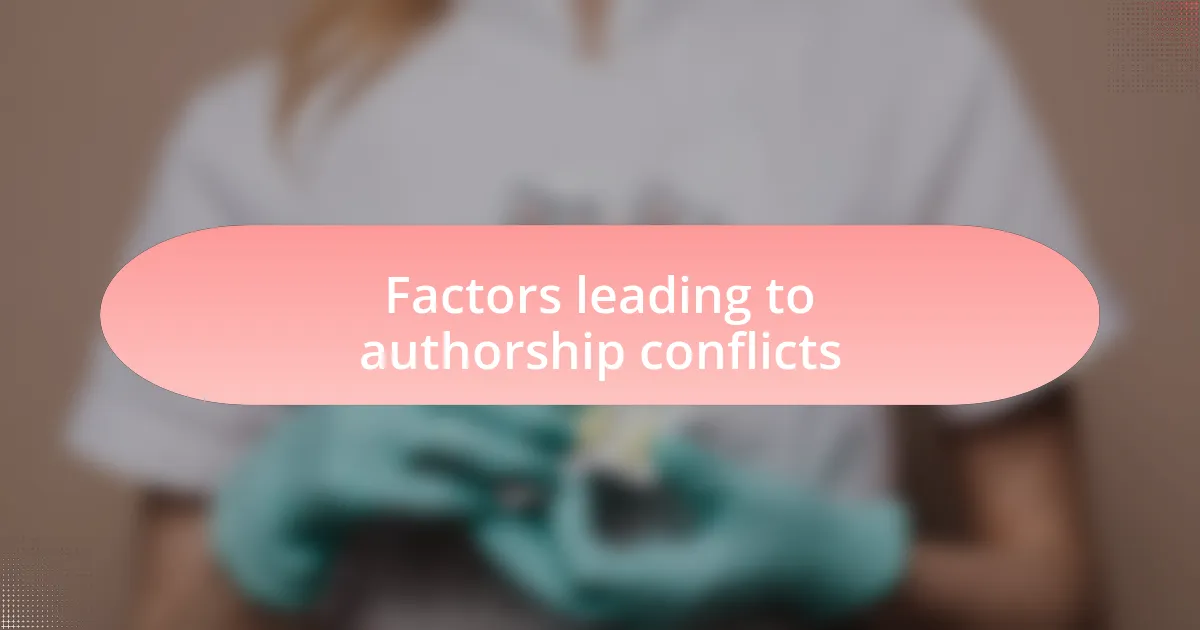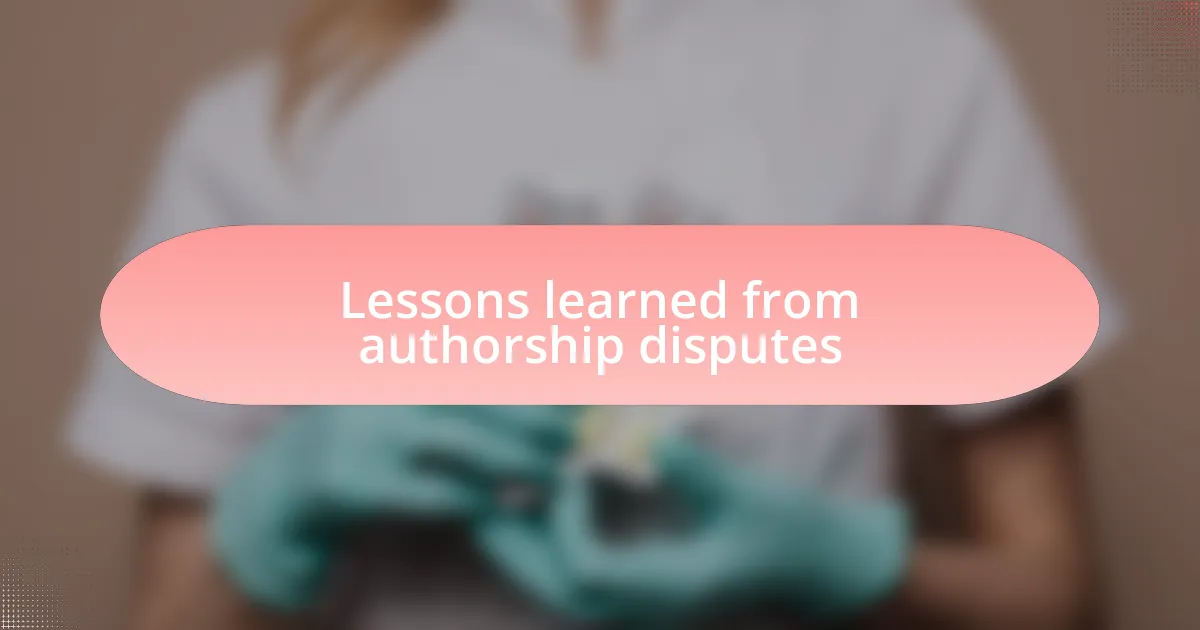Key takeaways:
- Authorship in research should reflect true contributions and requires clear communication from the project’s outset to prevent disputes.
- Common conflicts arise from perceived inequities in contributions, shifting roles, and issues of ghost authorship, highlighting the need for transparent authorship agreements.
- Involving a neutral third party for mediation and maintaining continuous communication can effectively resolve authorship disputes and foster collaboration.
- Recognizing emotional stakes and institutional policies around authorship criteria is crucial for positive team dynamics and equitable recognition.

Understanding authorship in research
Authorship in research isn’t just about listing names on a paper; it’s a reflection of contribution and accountability. I recall a time when a colleague felt overlooked on a project despite their significant input. It made me question—how often do we truly recognize the effort behind the scenes in research collaborations?
Different disciplines have varying norms regarding authorship, and understanding these can be crucial. For instance, in some fields, even those who provide funding or administrative support may be listed, while in others, it’s strictly those who contribute intellectually to the research. This variation can lead to misunderstandings and conflict—how can we navigate these differences effectively?
I’ve seen firsthand the importance of clear communication regarding authorship roles at the beginning of a project. It’s much easier to set expectations early on than to untangle disagreements later. Reflecting on this, I think—wouldn’t it be beneficial if all researchers had a clear, unified guideline that could foster transparency and fair credit in their work?

Common authorship disputes in research
Authorship disputes commonly arise from perceived inequities in contribution levels. For example, I once witnessed a situation where a team member believed they deserved first authorship based on hours invested, despite others contributing pivotal ideas. This raises an important question—how do we fairly assess contributions when collaboration is often a blend of effort and insight?
Another frequent source of conflict is the shift in roles during a project. I’ve experienced times when researchers shift focus, leading to varying degrees of contribution that weren’t initially anticipated. This dynamic can lead to bitter disputes about authorship—should the first author be determined by initial input or final contribution?
Then there’s the issue of ghost authorship, where someone contributes significantly yet isn’t listed as an author at all. I remember a discussion at a conference about how this practice undermines the integrity of research. It made me wonder how many voices are silenced in the academic practice—couldn’t we do better at recognizing everyone’s contributions?

Factors leading to authorship conflicts
One significant factor leading to authorship conflicts is miscommunication about roles and expectations from the very start of a project. I recall a project where we had a kickoff meeting, but it left many of us unclear about who was responsible for what. As time went on, it became evident that some team members felt overburdened while others thought their minimal involvement sufficed for authorship. How can we navigate these complexities without a clear framework for assigning credit from the outset?
Another minefield is the ambiguity surrounding what constitutes a “substantial contribution.” In one study I was involved in, a junior researcher spent countless hours stabilizing data, while senior team members contributed ideas and wrote the manuscript. The disconnect became glaring when it came time to assign authorship. What do we do when hours put forth don’t match the perceived value of the contributions? It’s a tough balancing act that can easily spiral into disputes.
Lastly, academic pressures and competition can exacerbate authorship conflicts. I once worked on a team where the rush to publish forced us into corners, prioritizing speed over thorough discussions on contributions. This urgency can breed resentment among those who feel their input is underappreciated. Can we shift our focus back to collaboration rather than competition in these scenarios? It’s a thought-provoking question as we strive for a more equitable approach to research authorship.

Strategies to resolve authorship disputes
One effective strategy to resolve authorship disputes is to establish a transparent authorship agreement early on. In a collaborative project I participated in, we developed a document outlining each member’s roles and contributions before starting the research. This proactive approach not only clarified expectations but allowed for open discussions about contributions as we progressed. Have I learned from that experience? Absolutely – discussing authorship at the beginning laid a strong foundation for mutual respect and understanding.
Another valuable method is to involve an impartial third party when conflicts arise. I remember a situation where two co-authors disagreed fiercely over their contributions, which escalated tensions in the team. By bringing in a senior researcher as a mediator, we could assess the contributions objectively, preventing the situation from deteriorating further. Wouldn’t it be easier if we recognized the need for unbiased perspectives sooner in the process, rather than letting the disagreements fester?
Furthermore, continuous communication throughout the research process is key. In another project, regular check-ins allowed team members to share their progress and reflect on their contributions. This informal approach not only fostered camaraderie but also offered an avenue to readjust roles and expectations in real-time. Isn’t it fascinating how consistent dialogue can transform potentially contentious situations into collaborative triumphs? It’s a reminder that keeping the lines of communication open is essential in nurturing a positive research environment.

Lessons learned from authorship disputes
Sometimes the hard lessons from authorship disputes can prove invaluable. I once faced a situation where a colleague felt slighted over authorship, which led to an unexpected fallout in our working relationship. Reflecting on this, I realized that clear communication about contributions not only enhances collaboration but can save professional relationships from the strain of unmet expectations. Why are we often hesitant to discuss these sensitive topics head-on?
Another takeaway is the importance of recognizing the emotional stakes involved. I recall a project where a junior researcher agitated passionately for recognition of their work. It was a stark reminder that authorship isn’t just about who did what—it’s also about validation and respect for individual contributions. Have you ever stopped to consider how lacking acknowledgement can impact motivation and morale within a research team?
Moreover, authorship disputes often highlight the necessity for institutional policies around authorship criteria. In the midst of a contentious situation, I discovered that having well-defined guidelines could have forestalled much of the confusion and tension we experienced. Why do so many research teams overlook this crucial aspect? It’s an opportunity to learn from past conflicts and ensure future collaborations are built on a foundation of clarity and fairness.